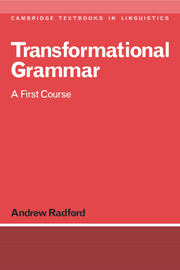6 - Clauses
Published online by Cambridge University Press: 05 June 2012
Summary
Overview
In the previous chapter, we took a detailed look at the internal structure of various different types of Phrases (Noun Phrases, Verb Phrases, Adjectival Phrases, Adverbial Phrases, and Prepositional Phrases). Now, by contrast, we shall turn to look in some detail at the internal structure of Clauses. Since much of our subsequent discussion will focus on similarities and differences between finite and nonfinite Clauses, we shall begin with a brief characterisation of the essential differences between these two Clause types.
Finite and nonfinite Clauses
The distinction between finite and nonfinite Clauses is based partly (though not wholly) on morphological criteria: thus, a Clause is finite if it contains a finite Verb (i.e. a Verb inflected for Tense/Agreement), and nonfinite if it lacks a finite Verb (e.g. if it is a verbless Clause, or if it is a Clause containing a nonfinite tenseless and agreementless Verb). Let's look briefly at the relevant Tense and Agreement properties which characterise finite Verbs.
From a morphological point of view, English can be said to have a binary (i.e. two-way) Tense contrast between present and past tense forms (in finite Clauses, obviously). The relevant set of inflections for finite regular Verbs are listed in (1) below:
(1) past tense: -(e)d for all persons and numbers
present tense: -(e)s for 3rd person singular forms
-ø for all other forms
(Note that ø represents a ‘zero inflectional morpheme’, and hence indicates that no overt ending is added to mark Tense in the relevant forms.)
- Type
- Chapter
- Information
- Transformational GrammarA First Course, pp. 287 - 336Publisher: Cambridge University PressPrint publication year: 1988



